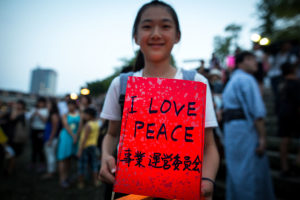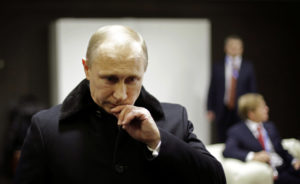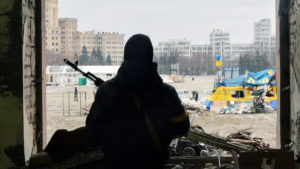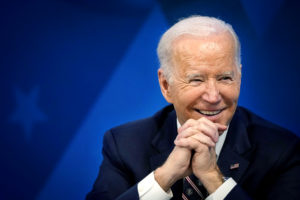Why would a leader decide to drop a nuclear bomb? Almost three weeks into Putin’s invasion of Ukraine, with still no end in sight, it’s a question that hasn’t felt so urgent since the outbreak of the Cold War. When asked recently whether the possibility of Russia using nuclear weapons was a “real concern” for the British government, Michael Gove replied: “Yes.”
But the answer is not so simple. Nuclear bombs have been dropped in conflict just once, in August 1945, by the United States. The horrific scenes of destruction and human suffering in Hiroshima and Nagasaki — and a death toll estimated to be about 200,000 civilians — provoked widespread condemnation. The theologian Reinhold Niebuhr wrote in the New York Times that the bombings were “morally indefensible”. Even hardened military figures were aghast. “We had adopted the ethical stand common to the barbarians in the Dark Ages,” grieved Admiral William Leahy, the US’s highest-ranking military commander.
Years later, the former Supreme Allied Commander Dwight Eisenhower told Newsweek: “It wasn’t necessary to hit them with that awful thing”. It was a comment that alluded to the military tactics behind the decision, which are separate from the more emotive philosophical debate over the morality of dropping the bomb. What does it mean for it to be “necessary” to drop a nuclear weapon? If it wasn’t necessary, then why did the US government — indeed, why would any government — willingly inflict such pain and suffering on civilians if there was a legitimate alternative path to peace?
The man who made the decision, Harry Truman, gave a lecture in 1959 to Columbia University students about the powers of the presidency. The talk was described as “earnest, good-humoured, and sometimes salty”, and was well-received by the 1,200-strong audience. But during the question and answer session, things took a more serious turn. A student thought it was odd that Truman had skirted over the nuclear question. When confronted with it, the usually good-natured Truman became a touch defensive:
“It was used in the war, and for your information, there were more people killed by the fire bombs in Tokyo than dropping of the atomic bombs accounted for. It was merely another powerful weapon in the arsenal of righteousness. The dropping of the bombs stopped the war, saved millions of lives”.
This is the orthodox view: dropping nuclear bombs saved lives. In this telling, the Japanese were not prepared to surrender, meaning the US and Soviet Union had two choices. They could either launch a land invasion, something on the scale of the D-Day landings in France, in which an estimated million US soldiers alone would be lost. Or they could prevent such a bloody undertaking by shocking the Japanese leadership into capitulation.
Death was not enough. The fire bombings of Tokyo, in which 100,000 people died in one night, had not proved sufficient. Something beyond conventional warfare was needed. Nuclear warfare was, as Truman’s Secretary of War Henry Stimson put it, the “least abhorrent choice”; though the bombs killed hundreds of thousands, even more would have died had they not been dropped.
The orthodox account depends on a number of key claims, including that the Japanese were unwilling to surrender in the summer of 1945. These claims have since been challenged by “revisionist” historians, who argue that Japan was in fact on the verge of surrender when the bombs were dropped.
The previous summer, Japan had lost Saipan, an island in the South Pacific, to America, meaning its mainland was within range of USAF B-29 bombers. This made Japan highly vulnerable to sustained US attacks from the air. On the night of 9 March 1945, over 300 B-29 bombers descended on Tokyo, inflicting the deadliest bombing raid in world history. After that, the revisionist account goes, the question was not whether Japan would surrender but on what terms.
The revisionists place heavy emphasis on contemporary reports that suggest the Emperor and some (but not all) of his advisers were inclined to surrender, so long as his position could be guaranteed. A month before Hiroshima, Navy Secretary James Forrestal wrote in his diary: “The first real evidence of a Japanese desire to get out of the war came today… [indicating] the Emperor’s strong desire to secure a termination of the war”. A 1946 report by the US Strategic Bombing Survey concluded: “in all probability prior to 1 November 1945 [the planned invasion date], Japan would have surrendered even if the atomic bombs had not been dropped.”
The revisionists believe that the US rushed to use nuclear weapons not because of Japanese intransigence, but because of the Soviet Union. Throughout the war, the USSR and Japan had honoured a neutrality pact. Stalin, however, assured Truman’s predecessor Franklin Roosevelt that three months after victory in Europe was achieved, the Soviet Union would turn its attention to the Pacific and declare war on Japan. Truman and his closest advisers believed that Roosevelt had already conceded far too much to Stalin at Yalta, effectively giving the USSR free rein to dominate eastern Europe. They were not keen for the same thing to happen in Japan.
The first bomb was dropped on Hiroshima on August 6. On August 8, exactly three months after the surrender of Germany, the Soviet Union declared war on Japan. The following day, the second bomb was dropped on Nagasaki. The day after, the Japanese government offered its surrender. The revisionists look at this timeline and intuit that the nuclear bombs were dropped primarily for political rather than military reasons. The US wished to deny the USSR credit for ending the war, which would have given Stalin greater leverage in the post-war settlement.
These two accounts — the orthodox and the revisionist — are the dominant explanations offered by historians, but they are not the only ones. Some scholars focus on the internal politics of Japan, arguing that the key figures who were ready for peace, not least the Emperor, were poor at communicating their wishes. They were, perhaps, drowned out by the powerful voices who wanted to continue the war. Many in the rank and file of the military were believed to be prepared to fight at all costs. US propaganda, which was racially inflected, tended to exploit the perception of Japan as a “warrior culture”, in which people would choose death over the shame of defeat. It was hard for Americans to discern Japan’s true intentions.
Other accounts suggest Truman was locked into decisions made by his predecessor. It was Roosevelt who had pushed for “unconditional surrender” at the Cairo conference in 1943. And the idea of dropping nuclear bombs on Japan was one Roosevelt had first dreamed up. In September 1944, he and Churchill met at FDR’s estate in Hyde Park, New York and agreed that “when a bomb is finally available, it might perhaps, after mutual consideration, be used against the Japanese, who should be warned that this bombardment will be repeated until they surrender”. Once Truman became president after Roosevelt’s death in April 1945, only one thing could apparently bring about “unconditional surrender”, and that was the bomb.
All of these interpretations offer important lessons to today’s leaders, but that last one is particularly chilling. If dropping the nuclear bomb was not militarily necessary to bring about an end to the war, then Truman opted for a decision that killed hundreds of thousands of civilians in part to save face. Once the US was committed to demanding “unconditional surrender” — for which there was enormous public support — Truman could hardly change his mind and say he wanted a negotiated peace. The new president, who had no political mandate of his own, would risk tanking his own domestic popularity before his term had even begun.
In other words, leaders must avoid making dangerous commitments from which either they or their successors will struggle to back down. Fortunately, in today’s conflict, no one has rashly insisted on “unconditional surrender”. A negotiated settlement is still possible.
With that in mind, it’s worth considering the vital role of intermediaries in such high-powered conflicts. With the help of a neutral party, could the Japanese peace camp have communicated its position more clearly, so as to assist those within the US administration who might have urged caution? The Japanese saw the Soviets as possible intermediaries, a view that was shattered when Stalin declared war on them. Today, Israel seems to be the go-between, though the nation has been criticised by Western commentators for not condemning Putin.
At Columbia University, Truman was asked, “With the development of nuclear weapons, do you think the United States would be willing to risk entering a third world war if a small European country in the Nato pact were to be involved in an act of aggression?” His answer was tepid: “I don’t know”. On consideration, he explained that the circumstances were now different, because unlike in 1945, the US was no longer the sole possessor of nuclear weapons: “I don’t think there’s any possible chance of doing what I tried to begin with, when we had absolute control of them, of nuclear weapons”.
This, strangely enough, is cause for optimism. When the US dropped its bombs on Japan, there was no other nuclear power to retaliate. In the intervening years, the threat of mutually assured destruction has seemingly prevented any other country from using such dangerous force.
It’s also worth observing that, while Ukrainians have shown an admirable fighting spirit in defending their nation from Russia, in the eyes of their people the two nations have a lot more in common than the Japanese did with the Americans. There has been no real attempt to use racial differences to demonise the enemy.
There is still a chance, then, that this war can be resolved through conventional methods. Putin is not in the same place Truman found himself in. Putin does not view it as “necessary” to drop a nuclear bomb. It has not yet become Putin’s “least abhorrent choice”. Let us hope it never does.
Disclaimer
Some of the posts we share are controversial and we do not necessarily agree with them in the whole extend. Sometimes we agree with the content or part of it but we do not agree with the narration or language. Nevertheless we find them somehow interesting, valuable and/or informative or we share them, because we strongly believe in freedom of speech, free press and journalism. We strongly encourage you to have a critical approach to all the content, do your own research and analysis to build your own opinion.
We would be glad to have your feedback.
Source: UnHerd Read the original article here: https://unherd.com





